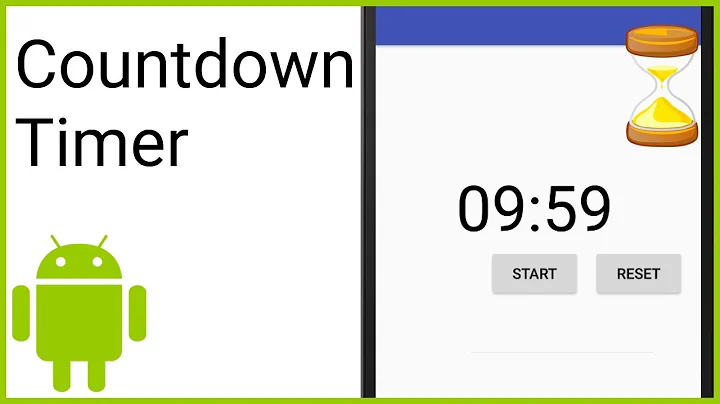Android Timer schedule vs scheduleAtFixedRate
Solution 1
The difference is best explained by this non-Android documentation:
Fixed-rate timers (scheduleAtFixedRate()) are based on the starting time (so each iteration will execute at startTime + iterationNumber * delayTime).
In fixed-rate execution, each execution is scheduled relative to the scheduled execution time of the initial execution. If an execution is delayed for any reason (such as garbage collection or other background activity), two or more executions will occur in rapid succession to "catch up."
Fixed-delay timers (schedule()) are based on the previous execution (so each iteration will execute at lastExecutionTime + delayTime).
In fixed-delay execution, each execution is scheduled relative to the actual execution time of the previous execution. If an execution is delayed for any reason (such as garbage collection or other background activity), subsequent executions will be delayed as well.
Aside from this, there is no difference. You will not find a significance performance difference, either.
If you are using this in a case where you want to stay synchronized with something else, you'll want to use scheduleAtFixedRate(). The delay from schedule() can drift and introduce error.
Solution 2
A simple schedule() method will execute at once while scheduleAtFixedRate() method takes and extra parameter which is for repetition of the task again & again on specific time interval.
by looking at syntax :
Timer timer = new Timer();
timer.schedule( new performClass(), 30000 );
This is going to perform once after the 30 Second Time Period Interval is over. A kind of timeoput-action.
Timer timer = new Timer();
//timer.schedule(task, delay, period)
//timer.schedule( new performClass(), 1000, 30000 );
// or you can write in another way
//timer.scheduleAtFixedRate(task, delay, period);
timer.scheduleAtFixedRate( new performClass(), 1000, 30000 );
This is going to start after 1 second and will repeat on every 30 seconds time interval.
Solution 3
According to java.util.Timer.TimerImpl.TimerHeap code
// this is a repeating task,
if (task.fixedRate) {
// task is scheduled at fixed rate
task.when = task.when + task.period;
} else {
// task is scheduled at fixed delay
task.when = System.currentTimeMillis() + task.period;
}
--
java.util.Timer.schedule(TimerTask task, long delay, long period)
will set task.fixedRate = false;
java.util.Timer.scheduleAtFixedRate(TimerTask task, long delay, long period)
will set task.fixedRate = true;
btw Timer doesn't work when screen is off. You should use AlarmManager.
There is sample:http://developer.android.com/training/scheduling/alarms.html
Related videos on Youtube
DXM
Updated on July 09, 2022Comments
-
DXM almost 2 years
I'm writing an Android application that records audio every 10 minutes. I am using a Timer to do that. But what is the difference between schedule and scheduleAtFixedRate? Is there any performance benefit in using one over the other?
-
 Mostafa Vatanpour almost 6 yearsit is very well explained in stackoverflow.com/a/22487142/5193370 answer.
Mostafa Vatanpour almost 6 yearsit is very well explained in stackoverflow.com/a/22487142/5193370 answer.
-
-
Cat over 11 yearsActually, if you specify the 3rd argument,
schedule()will repeat also. -
Cat over 11 years
schedule()can also have thatperiodargument specified. -
Cat over 11 yearsYou hadn't when I commented! Comment rescinded. ;)
-
 Lucifer over 11 yearsnopes, i did it before you commented it, then i comment that part in my code and wrote another method scheduleAtFixRate();
Lucifer over 11 yearsnopes, i did it before you commented it, then i comment that part in my code and wrote another method scheduleAtFixRate(); -
DXM over 11 yearsso are these two calls the same? timer.schedule( new performClass(), 0, 30000); and timer.scheduleAtFixedRate( new performClass(), 0, 30000);
-
Nappy about 9 yearsBe aware that, when you change the system time to a time in the past (on android this needs root), the timer will NOT execute your tasks for that amount of time in both the described cases.
-
 mehmet about 6 yearswhy there is no control for period must be bigger than delay. for example what does it mean. (period is smaller than delay) github.com/daimajia/NumberProgressBar/blob/master/demo/src/main/…
mehmet about 6 yearswhy there is no control for period must be bigger than delay. for example what does it mean. (period is smaller than delay) github.com/daimajia/NumberProgressBar/blob/master/demo/src/main/…








